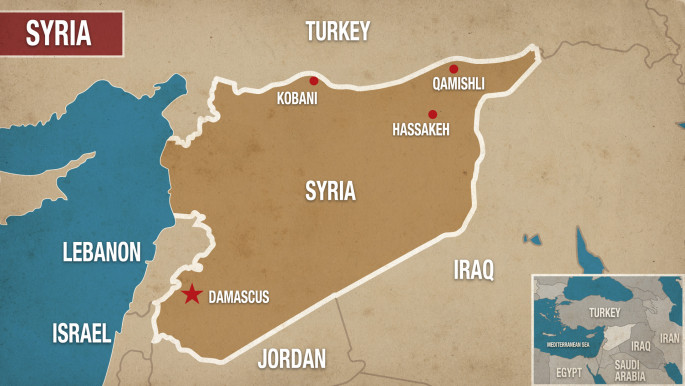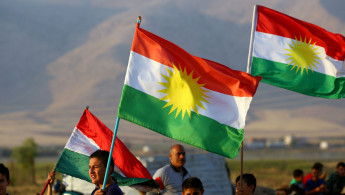Syria Weekly: Kurdish authorities incensed over regime-WHO coronavirus 'cover up'
Official figures indicate that the Covid-19 outbreak remains relatively stable, with Syria's ministry health on Sunday reporting just 38 cases and two deaths.
Many Syrians are understandably sceptical about the official narrative, with a spike in obituaries in local social media suggesting there are many more Covid-19 cases in Syria than are being recorded.
Reports of coronavirus outbreaks in eastern Syria, where there is a heavy presence of Iranian militias, have also been reported since the crisis began.
Syrian nurses and doctors have been instructed by intelligence officers to "bury" news of coronavirus deaths to prevent alarm in the country, one medical worker told the London School of Economics Conflict Research Programme.
"Given the total collapse of the economy and growing popular anger, the government doesn't want to give the people an additional reason to revolt against them," a medical professional said.
Overall a lack of medical equipment to detect the diseases and patients being asked to pay $50 for a test is also leading officials to downplay the number of cases in Syria, the report continued.
The Syria-Russia Coordination committee has also highlighted a shortage of medical equipment in Syria, including ventilators - a key device in the coronavirus epidemic - and blamed US sanctions for not allowing more supplies in.
"The authorities' abilities regarding diagnostics and treatment of coronavirus-infected people are severely restricted: around 100 tests are conducted in the country daily, there are only 25,000 beds in Syrian medical facilities, and there is a critical shortage of lung ventilators," a statement read, according to the pro-regime Al-Masdar news outlet.
Municipality workers and volunteers have continued to disinfect public areas, while a lockdown is still in place to help health the spread of the disease, although the official number of cases continues to rise.
For ordinary workers and small business owners the longer the lockdown continues, the more devastating it will be for their incomes. The lockdown is estimated to be costing Syria over $780 million a month, according to Syria Direct, hitting the already fragile Syrian economy hard and shrinking tax returns and incomes alike.
|
|
The first batch of Chinese aid to Syria of Covid-19 test kits and medication this week was able to fit inside two small cardboard boxes, indicating that the regime will not be able to rely on its international allies for assistance during the coronavirus crisis.
Russia has reportedly grown impatient with Assad over stalled reforms and ineffective government, instructing him to "change his behaviour before it is too late", according to Middle East daily Al-Sharq Al-Awsat.
This was accompanied by the release of a damning opinion poll regarding Assad's rule in a Russian-state linked media outlet, which was also said to be a message to the president to change his ways.
Syria's other major ally, Iran, will send Foreign Minister Mohammed Javad Zarif to Damascus for "security talks" with Bashar Al-Assad, which some commentators have suggested will be used by Tehran to tick-off the president over the government's current direction.
Deep resentment over the dire economic situation and coronavirus outbreak in Syria, has been coupled with a security threat to the regime in the south.
Ten attacks on regime positions have taken place in Daraa province over the past few weeks, the Syrian Observatory for Human Rights reported, with 15 regime and Hezbollah fighters killed in the ambushes, including high-ranking officers.
WHO anger
In the mostly Kurdish-controlled northeastern Syrian, authorities there reported their first death from Covid-19 after earlier denials from the regime.
A 53-year-old man was taken to a government hospital in the regime-Kurdish controlled city of Hassakeh on 22 March, where he was diagnosed with Covid-19.
The man passed away from the disease on 2 April, with the World Health Organisation only revealing the information of Friday.
 |
|
There was anger in the northeast about the delayed notification of the death from the regime and the WHO not dealing directly with health officials in the Kurdish-dominated autonomous administration.
"This dangerous and sensitive development happened in one of the areas of northeast Syria, but WHO did not notify the concerned authorities in the health sector of the Autonomous Administration of North and East Syria," the statement read, according to Kurdish media.
"We, the health authority, blame the World Health Organisation for the existence and the spread of coronavirus among our citizens, because it has covered up a suspected case and did not inform the autonomous administration."
The WHO only deals with the Assad regime directly, so test kits for northeastern Syria are dispatched from Damascus and then sent back for diagnosis.
This leads to a hugely convoluted and time-wasting process for coronavirus testing in the autonomous areas, according to Kurdish news agency Rudaw.
Tensions
The WHO said on Tuesday that airlifting 20 tonnes of medical supplies to Qamishli, but the airport remains under regime and Russian control so it is not clear if this will be given to the Kurdish authority.
Syrian-Kurdish officials have appealed to the Kurdish Regional Government in Iraq for assistance, with two coronavirus testing labs and staff sent to northwestern Syria this week, the outlet added.
Officials in northeastern Syria are also angered at Damascus allowing passenger flights to continue from the Syrian capital to Qamishli (inside Kurdish-controlled region but with some neighbourhoods under regime control) with fears that the disease could spread.
"We had an initial agreement with the regime to suspend all flights between Damascus and Qamishli [in the northeast] until further notice," said Raperin Hasan, a leading health official in the autonomous administration regime told Voice of America.
"But they keep sending flights without testing suspected passengers for the virus."
Hasan added that Damascus would be considered responsible for an outbreak of the coronavirus in northeastern Syria and accused the Syrian regime of "striving to spread panic" in the region outside government control.
These tensions follow a rare flare up between Kurdish security forces and regime troops in Qamishli earlier in April, which left one Asayesh fighter dead and another injured.
US forces have also been targeted by pro-regime activists in the Qamishli area, with similar angry protests leading to bloodshed.
Syrians in the region - both Arab and Kurdish - are hoping that tensions can be dampened, to allow for a major response to the coronavirus threat and prevent further instability that would benefit the Islamic State group.
Syria Weekly is a regular feature from The New Arab. To get Syria Weekly in your inbox each week, sign up here
Paul McLoughlin is a news editor at The New Arab.
Follow him on Twitter: @PaullMcLoughlin



